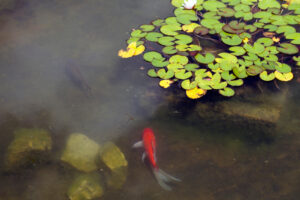As the holidays approach, your to-do list is likely growing: who’s coming to Thanksgiving or Christmas dinner? What are you going to decorate with? Have you crossed off all the gifts you need to buy?
 But there’s one more thing to add to that list if you have a backyard pond: getting it ready for winter. It may sound like just another task, but preparing your pond for the colder months can save you time, money, and stress down the road. Here are a few easy steps to ensure your pond survives the winter and stays healthy for the next season.
But there’s one more thing to add to that list if you have a backyard pond: getting it ready for winter. It may sound like just another task, but preparing your pond for the colder months can save you time, money, and stress down the road. Here are a few easy steps to ensure your pond survives the winter and stays healthy for the next season.
1. Clean Your Pond
Start by clearing out any dead plants, leaves, flowers, algae, or other debris from the water. Be careful not to remove floating plants that will regrow in the spring. Dead plant material releases gases into the water as it decays, which can harm your fish. Regular cleaning will also keep your pond looking beautiful throughout the colder months.
2. Move Hardy Plants Deeper
To protect your hardy live plants from freezing, move them to a depth of at least 18 inches. If your pond freezes completely, you’ll need to bring these plants indoors to protect them. As for more tender plants like tropical lilies, it’s best to remove them and bring them inside before the temperature drops.
3. Prepare Your Fish for Winter
If you have fish that might not survive the winter temperatures, it’s time to bring them indoors. Set up an aquarium or tank inside your home using water from your pond, or treat tap water to remove chlorine. This ensures your fish stay safe and healthy until spring.
4. Clean Your Pond Filter
Make sure to clean your pond filter before the cold sets in. You should move the filter to the surface of the water to help keep the water from freezing completely. The bubbles released by the filter will help maintain water circulation and prevent ice buildup.
5. Reduce Feeding for Fish
As the temperature drops, reduce the amount of food you give your fish. When the water temperature falls below 50°F, stop feeding them altogether. At this point, the fish will enter semi-hibernation, and they can survive on the nutrients already present in the water. Overfeeding can lead to excess waste, which can harm the pond ecosystem.
6. Prevent Ice from Forming
During the winter, your main concern will be ice formation. A floating pond deicer will help keep a portion of your pond unfrozen, allowing harmful gases to escape the water. If you don’t have a deicer, you can use a floating ball or even a piece of wood on the surface to prevent the ice from completely covering the pond. This will help maintain a healthy environment for your fish throughout the season.
Get Everything You Need at Mendham Garden Center
At Mendham Garden Center, one of the leading garden centers in NJ, we carry all the supplies you need to prepare your pond for winter, including pond pumps, filters, fish food, and plants. Contact us today to learn more about how to properly care for your backyard pond as the weather cools down, and get everything you need to make sure your pond thrives in the warmer months ahead.
